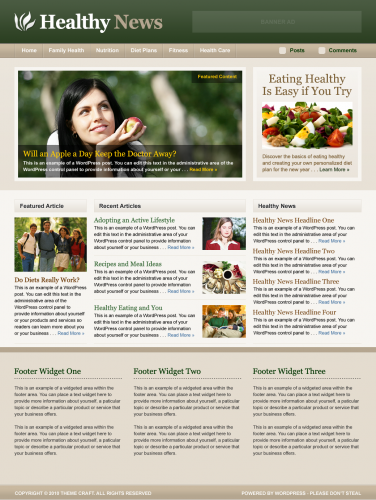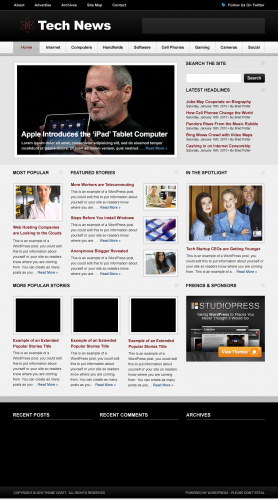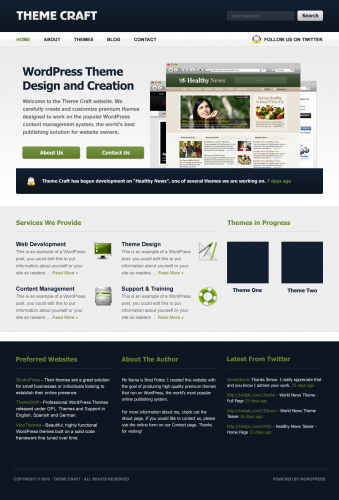In what I hope will be a regular occurrence, this is an interview with a featured member of the WPTavern forum. I hope to put the spotlight on at least one forum member per month. The member I choose to interview is random but in order to be in the running, you only have to be a member of the WPTavern forum. All the images in this post are briefs so they are subject to change. Without further adieu, here is the interview I conducted with Brad Potter.
How long have you been using WordPress?
I’ve been using WordPress for 2yrs. The first year was mostly spent experimenting with the software and various themes while I used other well known CMS solutions. I really became serious about using WordPress in the second year.
A year ago, you were just getting into the thick of things regarding WordPress themes. Now, you’re creating them on your own. How did you go from point A to point B?
I think that involves numerous resources really.
One book that helped me early on was “WordPress Theme Design” by Tessa Blakeley Silver.
Themes – I’ve purchased Unlimited or Developer packages from StudioPress, WooThemes, Press75 and Elegant Themes. I’ve also purchased individual themes from ThemeShift, Pro Theme Design and ThemeForest. While that might seem excessive to some, it’s given me the ability to analyze and experiment with a wide variety of themes built by some of the best developers in the commercial WordPress industry.
Websites – Some of my favorite websites for learning about WordPress development are themelab.com, digwp.com, wpengineer.com, wprecipes.com, themeshaper.com, justintadlock.com, wphacks.com, nettuts.com and of course wptavern.com.
Frameworks/Starter Themes – I’ve spent some time studying frameworks like Ian Stewart’s “Thematic“, Justin Tadlock’s “Hybrid” and Ptah Dunbar’s “WP Framework“. There are also some great starter themes that can help point a person in the right direction as well. “Starkers” by Elliot Jay Stocks, “Gravy” by Darren Hoyt, “Starter Theme” by Dan Philibin and the recently released “BLANK Theme” by Chris Coyier are a few.
WordPress Codex – While it’s not the easiest to navigate and search, I’ve spent a fair amount of time reading the Codex.
Considering the large amount of themes you’ve worked with in the past year, what are some of the trends you noticed?
I’ve seen more and more theme developers building in a greater number of sophisticated theme options and widgets making it easier for end users to get setup and running in a shorter amount of time. While a ton of theme options won’t always appeal to the more hard core developers, they certainly help newer users and likely cut down the number of support issues.
I’ve also begun to see more targeted solution based themes appear which I think is definitely a step in the right direction. Real Estate, Job Boards, Classifieds, Restaurant and Travel themes are a few examples.
Better design. I’ve definitely noticed the level of design being stepped up a notch. I think that can be attributed to several things. Theme developers hiring established designers, in-house designers improving their skills and increased competition in the marketplace.
In your opinion, what makes a good theme?
There are a lot of good themes but a “great” theme is one that has well structured code & style sheets, nicely integrated theme options, polished design, detailed documentation and equally important, competent support.
Out of all the theme frameworks available, have you found one that suits your needs?
Lately, I’ve really enjoyed using the Genesis Theme Framework by StudioPress which is available for free to all Pro Plus members. I was active in the beta testing period and hopefully I provided some valuable feedback to Brian Gardner and Nathan Rice. Genesis has great appeal to me for various reasons but I especially appreciate some of the built-in custom widgets like the Featured Page and Featured Posts. The Featured Posts in particular has tremendous flexibility and is very handy for building out the home page of various sites. I also appreciate the six layout options that can be used with either posts or pages. Most of all, you can really tell a lot of thought has gone into what’s under the hood. I would say Genesis definitely meets my criteria for what makes a great theme framework.
I’m also very impressed with “Canvas“, the latest theme offering by WooThemes. While the WooCrew says they are hesitant to label Canvas a “theme framework“, it contains all the goodness of the WooFramework2, is clean with a minimalist design and is much more advanced than your typical theme. Canvas has a huge amount of theme options that allow you to modify just about everything including layout, size, colors, borders, font sizes, font families and more. One other really useful feature is the new integrated WooNav which is being built into the core of WordPress 3.0. Canvas also has a liberal amount of hooks so you can basically transform it into just about any design you may desire. I had the opportunity to do some early beta testing on Canvas with Magnus Jepson and appreciated how he really took the time to listen to everyone’s feedback during the development cycle. Whether you call it a framework or not, Canvas can definitely form the basis of a superb WordPress theme.
What tips can you offer for those aspiring to be theme designers/creators?
While I’m brand new to the game on theme development, I can only share what’s working for me thus far.
Don’t be afraid to spend a few dollars buying a theme even if it’s for learning purposes only.
Get plugged-in. Follow, study and learn from the leading developers and designers in the industry. Many of them post valuable insights and information on their commercial blogs, private blogs and via twitter.
Participate in WordPress related forums and don’t be afraid to ask questions even if they appear to be dumb.
Read. I’m buying two more books myself, the “WordPress Bible” by Aaron Brazell and “Digging Into WordPress” by Chris Coyier and Jeff Starr.
If anyone tries to tell you the market is saturated, don’t listen to them. Chances are you have something unique to add to the marketplace and community. If you fail at first, that’s fine. Many times failure precedes the path to success. One of my favorite quotes is “The greatest risk in life is not taking one”.
Has the WPTavern site/community helped you at all in your quest to be a theme designer?
I joined WPTavern in January 09 right about the time I was becoming serious about using WordPress in client website development. WPTavern.com is definitely one of my “go-to” places on the web in order to stay current with a large variety of WordPress topics, theme development included. I’ve enjoyed interacting with and learning from people in the WPTavern forums and WordPress Weekly is with out a doubt one of my favorite podcasts.
Where can we go to keep an eye on your work?
I’m working on a new site to showcase my themes that are currently in development. In the meantime Twitter would be the best way to follow me as I’ll make any announcements there. http://www.twitter.com/bradleypotter




Brad has used A LOT of themes it seems. I’m only familiar with WOO themes.
Brad have you got any experience using Elastic? =)